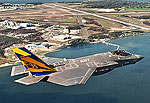First Navy Pilot Flies Carrier Variant Of Lockheed Martin F-35
 NAVAL AIR STATION PATUXENT RIVER, Md., February 14th, 2011 -- Lt. Cmdr. Eric “Magic” Buus on Friday became the first United States Navy pilot to fly the Lockheed Martin [NYSE: LMT] F-35C Lightning II. The F-35C will operate from the U.S. Navy’s large aircraft carriers by way of catapult launch and arrested landing. The United Kingdom’s Royal Navy and Royal Air Force also will employ the F-35C.
NAVAL AIR STATION PATUXENT RIVER, Md., February 14th, 2011 -- Lt. Cmdr. Eric “Magic” Buus on Friday became the first United States Navy pilot to fly the Lockheed Martin [NYSE: LMT] F-35C Lightning II. The F-35C will operate from the U.S. Navy’s large aircraft carriers by way of catapult launch and arrested landing. The United Kingdom’s Royal Navy and Royal Air Force also will employ the F-35C.
“The in-air handling qualities of the F-35C are excellent, and very similar to the B variant. I immediately felt right at home in the aircraft,” said Lt. Cmdr. Buus. “The Navy should be excited about having an aircraft that will be able to launch from our carriers with enough internal fuel and weapons to project power where we need to, and will have the stealth characteristics to go in and out of harm’s way unseen. This will be a great leap in technology and capability for the future of Naval Aviation.”
The mission lasted 2.1 hours and was the 32nd flight for CF-1, the first F-35C test aircraft. Lt. Cmdr. Buus has now flown both F-35 sea-service variants. On Feb. 3, he became the first Navy pilot to fly the short takeoff/vertical landing F-35B, to be operated by the U.S. Marine Corps and the Italian Air Force and Navy.
The F-35C is scheduled to begin land-based catapult launches and arrested recoveries later this year, with ship-board test flights beginning in 2013. The F-35B will begin test operations from U.S. Marine Corps amphibious assault ships this fall.
F-35s have completed a total of 624 test flights, including 78 flights in 2011. The F-35B has completed 32 vertical landings, including 22 in 2011.
The F-35 Lightning II is a 5th generation fighter, combining advanced stealth with fighter speed and agility, fully fused sensor information, network-enabled operations and advanced sustainment. Lockheed Martin is developing the F-35 with its principal industrial partners, Northrop Grumman and BAE Systems.